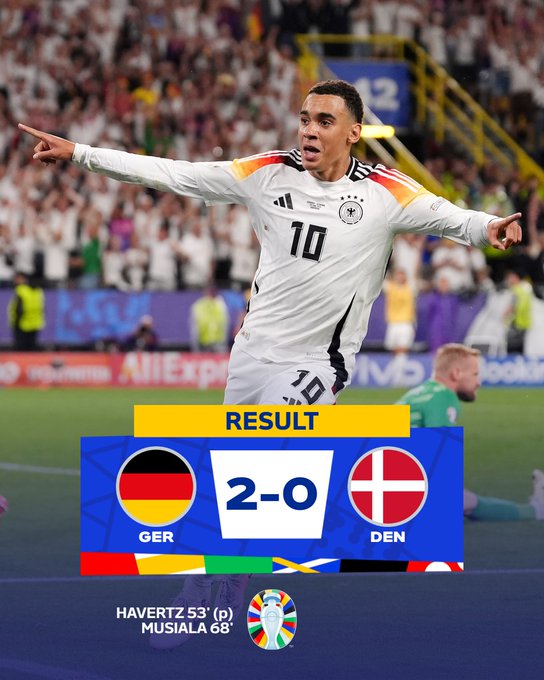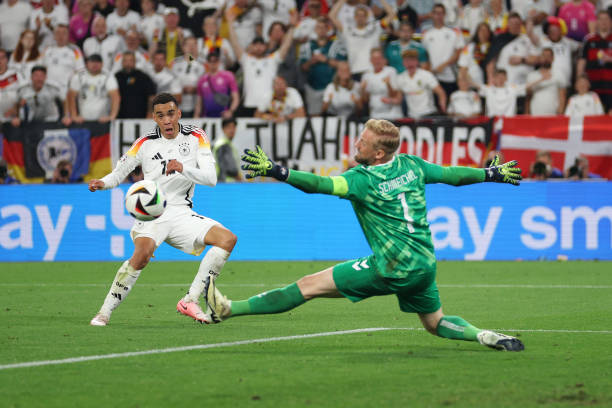The Westfalen Stadium (also known as Signal Iduna Park or Dortmund) witnessed a special match. There was no extra time, but it lasted more than 120 minutes. From about the middle of the first half, there was a storm with thunder and lightning, then pouring rain. When the raindrops were as big as stones, pounding the pitch, referee Michael Oliver was forced to stop the match for more than 25 minutes.
Not only the weather, Germany also experienced “stormy” periods in terms of expertise in this match, before overcoming a resilient Denmark as usual and winning the first knockout round victory at a major tournament since Euro 2016.

Lightning in the sky over Signal Iduna Park, Dortmund during the Germany – Denmark match on June 29. Photo: Reuters
Early in the second half, in a chaotic situation in the German penalty area, central defender Joachim Andersen quickly finished and celebrated the goal for Denmark. Most of the audience in the 66,000-seat stadium seemed stunned. At the 2006 World Cup, the last major football event held in Germany, it was here that the host team was defeated by Italy in the semi-finals. And the haunting seemed to appear.
But, VAR came to Germany’s rescue, determining that midfielder Thomas Delaney was offside earlier, so Denmark’s goal was canceled. Not only that, just a few minutes later, VAR confirmed that the ball had touched Andersen’s hand in the Danish penalty area in another situation. Germany was awarded a penalty and took the lead thanks to Kai Havertz’s low left-footed shot. Goalkeeper Kasper Schmeichel guessed correctly and got his hand on the ball, but it went too far.

It was Havertz’s second goal of the tournament, both from penalties. Despite the controversy, the No. 7 is Germany’s third-highest scorer at the Euros (four goals, one behind Jurgen Klinsmann and Mario Gotze). He has also scored five goals in his last 10 games for Germany. That’s probably why Havertz raised his hand to his ear as he celebrated his opening goal, as if to challenge his critics.

Havertz (No. 7) celebrates the opening goal for Germany. Photo: Reuters
VAR helped Germany in two consecutive situations mentioned above at the beginning of the second half. But it was also the technology that made the match difficult for them. The home team started the game with a bang and took the lead after just four minutes when Nico Schlotterbeck headed home from a Toni Kroos corner. However, VAR overturned the goal for a foul by Joshua Kimmich on Andreas Skov Olsen.
Dominating the first 20 minutes but unable to take advantage of opportunities, Germany gradually encountered difficulties as the Nordic representative got into the rhythm of the match.
Denmark is not a big football nation in Europe, but they always know how to make their mark when given the chance. 32 years ago, they wrote a fairy tale at Euro by going from the team that received a wild card to the championship. In the final that year, their defeat was Germany. That is considered a great inspiration for the Danish players in this match. And if Christian Eriksen or Rasmus Hojlund make good use of their opportunities, surprises can happen in the first half.

With the match at a stalemate, referee Oliver called a temporary halt in the 35th minute due to bad weather. When the game resumed, both sides continued to trade blows. Havertz and Hojlund both had dangerous shots in each other’s penalty areas, but the first half ended goalless.
The favorable developments at the start of the second half gave Germany a breather. After Andersen used his hand to block David Raum’s cross, leading to a penalty, Denmark’s spirit showed signs of decline. The Nordic team’s two defenders were easily surpassed by Havertz in the 59th minute with just one ball control. However, the home striker sloppily chipped the ball in a face-off, missing the chance to score twice.
However, just 10 minutes later, Germany doubled their lead. From a long pass from Schlotterbeck, Jamal Musiala broke through to face Schmeichel. The Danish goalkeeper tried to rush out but hesitated, allowing Musiala to shoot from a wide angle and then curl the ball into the far corner. This was the German winger’s third goal at the Euros, just one less than the record set by Wayne Rooney for an under-21 player.

Musiala beat goalkeeper Kasper to seal a 2-0 victory for Germany. Photo: AFP.
This goal also put an end to Denmark, in the context of Eriksen and his teammates’ physical decline. The “tin soldiers” did not create any more clear chances and were lucky to escape another defeat, when VAR denied a goal from substitute Florian Wirtz – who lost his official position to Leroy Sane in this match.
With a 2-0 win, Germany advanced to the quarter-finals to face the winner of the Spain-Georgia match. In addition, coach Julian Nagelsmann and his team also somewhat regained confidence after the draw with Switzerland in the final round of the group stage, with scientific, enthusiastic and effective play. Yesterday, Germany controlled the ball 55%, launched 15 shots, and up to nine of them were on target – compared to Denmark’s two. Their expected goals were 2.66 – much higher than their opponents’ 1.05.